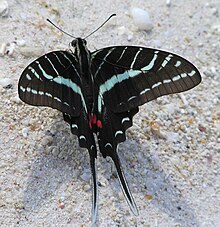Eurytides philolaus
| Eurytides philolaus | |
|---|---|

| |

| |
| Scientific classification | |
| Domain: | Eukaryota |
| Kingdom: | Animalia |
| Phylum: | Arthropoda |
| Class: | Insecta |
| Order: | Lepidoptera |
| Family: | Papilionidae |
| Genus: | Eurytides |
| Species: | E. philolaus
|
| Binomial name | |
| Eurytides philolaus | |
| Synonyms | |
| |
Eurytides philolaus, the dark zebra swallowtail or dark kite-swallowtail, is a butterfly of the family Papilionidae. It is found from southern Texas to northern South America.[2]
The wingspan is 90–95 mm.
"Antenna black; the 7. pale green band of the forewing only represented by a spot; hindwing with 2 red spots posteriorly; on the under surface the red line of the hindwing edged with black at both sides, undulate anteriorly. Scent-scales of the male short, broad, irregular, produced in a number of filaments. The female is in 2 forms: female f. philolaus Boisd. similar to the male, the underside paler, female f. niger Eimer (nigrescens Eimer; felicis Fruhst.) the pale green bands of the membrane of the wings scaled with black, the wings therefore black with slight traces of the bands."[3]
Biology
[edit]
The butterfly is found in low situations, often resting in crowds on the sand at the edge of rivers. The larvae feed on Annonaceae species.
Subspecies
[edit]There are two recognised subspecies:
- Eurytides philolaus philolaus (Mexico, Honduras, Costa Rica, southern Texas) [4]
- Eurytides philolaus xanticles (Bates, 1863) (Panama, northern Colombia, northern Venezuela)[5]
References
[edit]- ^ Protographium at funet
- ^ Butterflies and Moths of North America
- ^ Jordan, K. , in Seitz, A. ( 1907) . The Macrolepidoptera of the World. 5: The Macrolepidoptera of the American faunistic region. Papilionidae 1-45
- ^ Lewis, H. L., 1974 Butterflies of the World ISBN 0-245-52097-X Page 24, figure 2
- ^ Lewis, H. L., 1974 Butterflies of the World ISBN 0-245-52097-X Page 24, figure 7
Further reading
[edit]- Edwin Möhn, 2002 Schmetterlinge der Erde, Butterflies of the world Part XIIII (14), Papilionidae VIII: Baronia, Euryades, Protographium, Neographium, Eurytides. Edited by Erich Bauer and Thomas Frankenbach Keltern: Goecke & Evers; Canterbury: Hillside Books. ISBN 978-3-931374-87-7 All species and subspecies are included, also most of the forms. Several females are shown the first time in colour.
